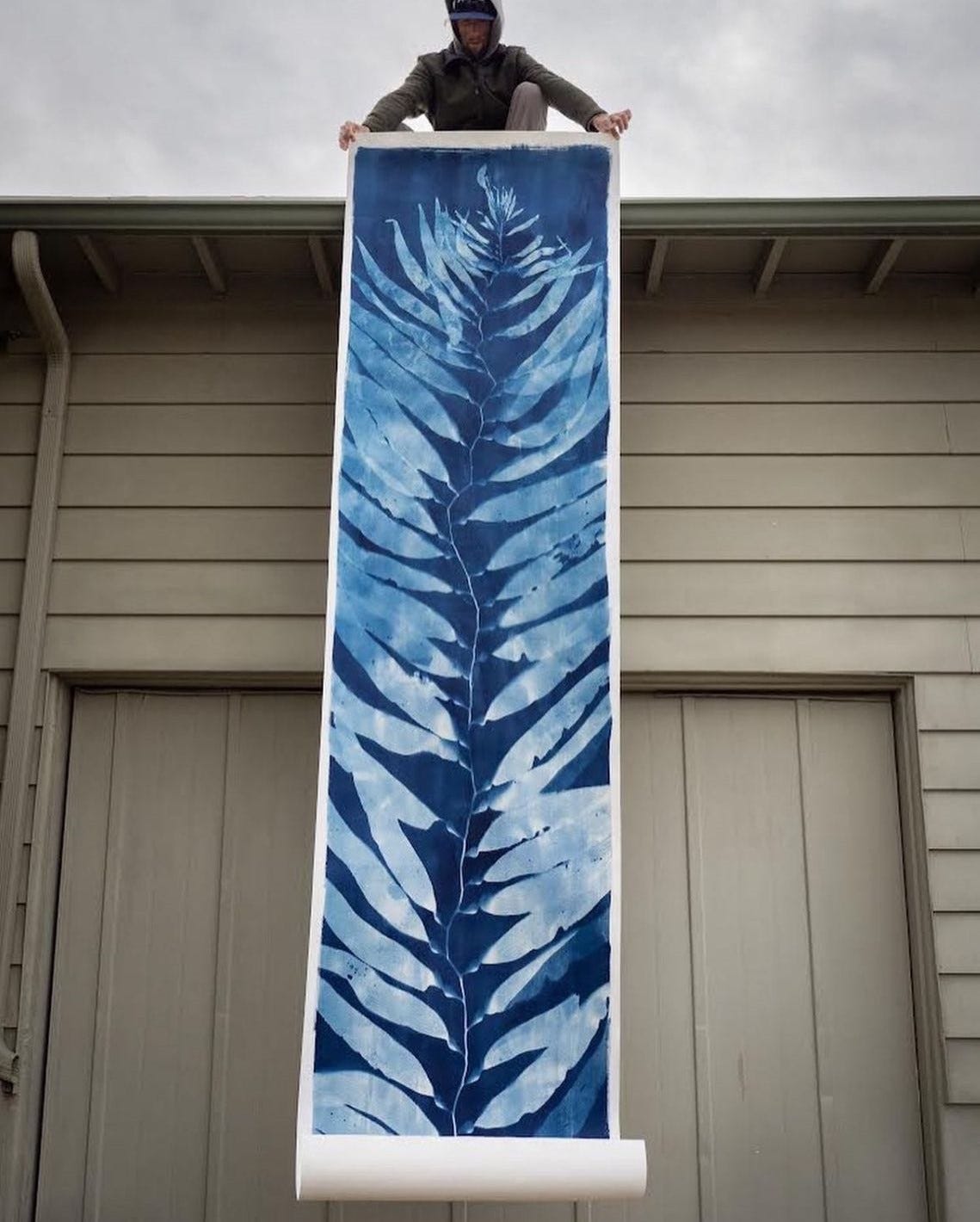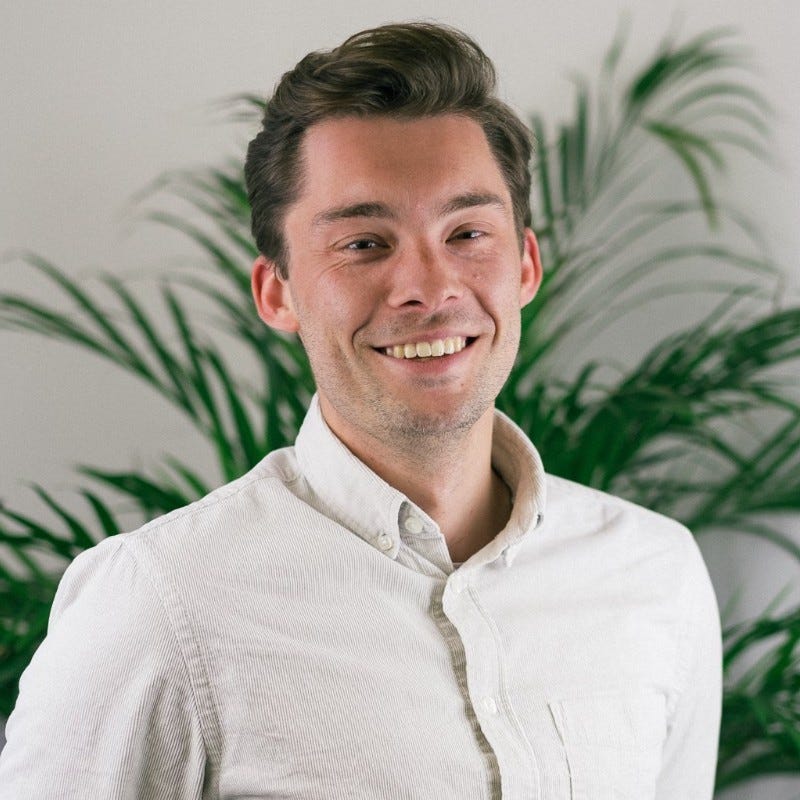🌍Evaluating algae tech impact
PLUS SIMRIS ALG targets biopharma, democratising impact investing with capacura, and do oceans absorb more CO2 than expected?
"Keep an open mind and be patient. If the timing’s right, who knows where you'll end up." — Finn Rogge, capacura
Dear algae technologists - hello and welcome to the Paxtier Report!
Apologies for the delay - it was an action-packed week in the world of algae tech.
To start this email, let me draw your attention to Oriana Poindexter’s giant kelp prints:
Oriana creates these pieces using cyanotype - a 170-year-old photographic printing process that uses sunlight for exposure and water for development.
Inspired by contemporary photographers like Meghann Riepenhoff, Poindexter makes cyanotypes to represent the wonder she experiences from the ocean:
‘I want to get people excited about the ocean. And to me, the ocean really does a way better job of inspiring people than any intermediary can. So, my goal is to try and give people a glimpse of being underwater.'”
See more HERE.
In today’s report:
Markets: 🟢SIMRIS ALG targets biopharma
Deals: 🤝Subak funds NZ climate-focused research
Research Rundown: 🧪Evaluating microalgal impact with a LCA
Movers and Shakers:🌍Democratising impact investing with capacura
Around the web: 🌊Do oceans absorb more CO2 than expected?
Markets and Investing
✂️Algae Market Snippets
Some big moves this week included:
A boost for New Zealand's seaweed farming sector - A seaweed and freshwater algae aquaculture licence has been granted to the University of Waikato and WaikatoLink Ltd in New Zealand. (Read more HERE).
Renewable energy innovation boosted by £37m government funding - Increasing the growth of elephant grass (miscanthus), farming seaweed off the North Yorkshire coast, and increasing the harvesting capacity for willow are among 12 projects receiving a share of £32 million funding under Phase 2 of the Biomass Feedstocks Innovation Programme, which aims to find new ways to increase biomass production in the UK. (Read more HERE).
£7 million awarded for renewables and aquaculture co-location research - A new project that aims to investigate growing kelp and mussels alongside offshore wind turbines – as well as researching the potential for artificial reefs – has been awarded a NOK 84 million (£7 million) grant. (Read more HERE).
SIMRIS ALG is targeting biopharma to exploit highest value verticals in the microalgae and cyanobacteria space (Read more HERE).
Global firm Subak funds NZ climate-focused research for first time - Subak has funded Blue Carbon Services - "We think giant kelp is a potent natural tool for curbing global warming. Trees store carbon only in living organic matter, drawing CO2 down over 30 to 100 years. Giant kelp, however, grows much faster than trees locking away carbon in both living and dead organic matter, profusely shedding organic matter into the ocean, continuously and indefinitely."" Blue Carbon founder Dr Robert Hickson said. (Read more HERE).
Algal oil producer Veramaris sets 2030 emissions target ahead of expansion - The algal oil producer is aiming to reduce its Scope 1 and 2 emissions by 38% over the next eight years... (Read more HERE)
Kingfish and Asparagopsis producers team up - Clean Seas has signed an R&D collaboration with CH4 Australia to produce methane-reducing Asparagopsis seaweed in its South Australian yellowtail kingfish hatchery. (Read more HERE).
DIC Corporation and biotech startup Green Science Materials, Inc. (GSM) expand their collaboration on Suizenji Nori blue-green algae and SACRAN™ polysaccharide extract, developing Suizenji Nori indoor mass cultivation technology needed to deliver the stable production of SACRAN™ required for global scale. (Read more HERE)
EBIS Algae Research Institute Inc. announced that it has received funding from Kyokuyo Co., Ltd. (Read more HERE).
Vital Nutrients Launches First-to-Market Vegan Omega with SPMs. (Read more HERE).
B’ZEOS were recently granted Eurostars funding from Eureka Network to develop their SeaweedPack R&D project together with partner firm Moses Productos. (Read more HERE).
The €11m Horizon Europe REALM project has kicked off - allowing microalgae producers to slash their freshwater footprint (Read more HERE).
Lgem/Synalgae has started a collaborative project with FUL to develop a robust cultivation and extraction system, aiming to produce ingredients and semi-finished products that can be used directly in the food industry. (Read more HERE).
In depth with Peter Green
🌱Democratising impact investing with capacura
Last week, I had the pleasure of speaking to Finn Rogge, Investor Relations Manager at capacura - an early-stage impact investor based in Cologne, Germany.
Founded in 2018, capacura enables you to invest in impact startups by democratising the financing of startups in the fields of health, education and environment.
In this teaser from our recent chat, Finn and I discuss capacura’s mission, how his team screens startups, and advice for others in the impact space.
What does capacura do?
We enable everyone to invest in impact startups and our goal is to fully democratise impact investing.
To help us on this mission, we've built a platform with which you can directly invest into our portfolio startups.
Importantly, we are always invested ourselves in the startups we feature on our platform, and we actively manage and support these impact teams on all fronts- from fundraising and financing to marketing and technical advice.
How do you screen startups for your platform?
We do a mixture of active and passive selection, which is facilitated thanks to our AI algorithm. This algorithm evaluates and scores startups on several fronts including, for example, business model, culture, innovation, sustainability, and most importantly - timing.
Startups that meet our specific criteria in these areas will progress to the next stage, after which our investment managers will begin the due diligence process and have personal interviews with the founders.
What advice would you give to others in this domain?
Keep an open mind and be patient. If the timing's right, who knows where you'll end up. For example, I entered the world of impact investing without any previous financial experience - my background was in international relations and sustainable development.
But after starting two impact startup projects myself (which failed), I wanted to learn more about creating and supporting companies that improve the planet and our society.
By following my curiosity, I eventually stumbled across capacura in a podcast. I wanted to join their mission to democratise impact investing, so I reached out on LinkedIn and about a month later, I joined the team.
If you’d like to learn more about capacura and how you can start with impact investing yourself, be sure to check out their website, and follow Finn on LinkedIn here.
📝Research Rundown: Evaluating microalgal impact with a LCA
THE BIG IDEA
For many years, aquafeeds have relied heavily on fish oils sourced from wild-caught forage fish.
And while these fish-based products have worked wonders for the aquaculture industry, experts are worried about demand outstripping forage fish supplies.
To deal with this, microalgae oils extracted from the heterotrophic Schizochytrium sp. have been touted as a sustainable alternative…
... But just how sustainable are these oils? And how do they compare with original fish oil products?
McKuin et al.’s paper set out to find the answers.
The breakdown
To explore the environmental impact of these products, this team of researchers developed a new life cycle assessment (LCA) which directly compared fish oil to whole-cell or extracted oil of Schizochytrium combined with canola oil.
This test evaluated the products across the following areas:
Global warming potential, water consumption, land use, marine eutrophication potential, freshwater eutrophication potential, and biotic resource use.
And ultimately…
… The results came back pretty mixed.
For example, they found that Schizochytrium sp. could be a more sustainable feed ingredient in categories like global warming impact and use of biotic resources from living organisms.
But there were “comparatively greater environmental impacts in other areas—like freshwater use, land use, and nutrient pollution potential in oceans and freshwater”. This stems from the fact Schizochytrium sp. must be fed sugars while it's being grown commercially (and these sugars typically come from land-based agriculture sources.)
Nevertheless, be sure to check out…
… The suggestions for minimising environmental impact - which are quite transferable tips. For example, areas for potential improvements include using alternative carbon sources - like crude glycerol from biodiesel, using whole-cell Schizochytrium products which have less processing steps, or cultivating high-DHA microalgae.
🔥 What else was hot in algae tech this week?
(Paper) A global dataset of seaweed net primary productivity (Nature)
AgriSea NZ Seaweed Ltd win the Maori Company of the Year title at the NZ Hi-Tech Awards 2022. (Read more HERE).
The Dutch Weed Burger: “Seaweed is Considered the First Plant on The Planet and Has Been at the Foundation of Life as We Know It”- (Read more HERE)
Podcast: Microphyt talks up microalgae’s role in weight management, brain health & sports nutrition (Read more HERE).
Do oceans absorb more CO2 than expected? (See more HERE)
(Paper) Engineering micro oxygen factories to slow tumour progression via hyperoxic microenvironments (Nature)
Community project aims to help the kelp - Michael Kollins’ community project focuses on researching, restoring and replicating kelp forests near Vashon Island. (Read more HERE).
As Lobstering Weakens With Climate Change, Seaweed Farming Is Reviving An Industry (Read more HERE).
Modeling the uncertain future of Northern California’s bull kelp forests (Read more HERE).
Twenty-four million tonnes of sargassum seaweed smother Caribbean coasts, threatening animals and industry. (Read more HERE).
New PAIR research aims to facilitate growth in South Sulawesi’s seaweed sector. (Read more HERE).
🐦Tweet of the week
That’s all folks!
Thanks again for joining us this week. Hope you have a great day and stay tuned for more algae tech updates soon!
Peter









